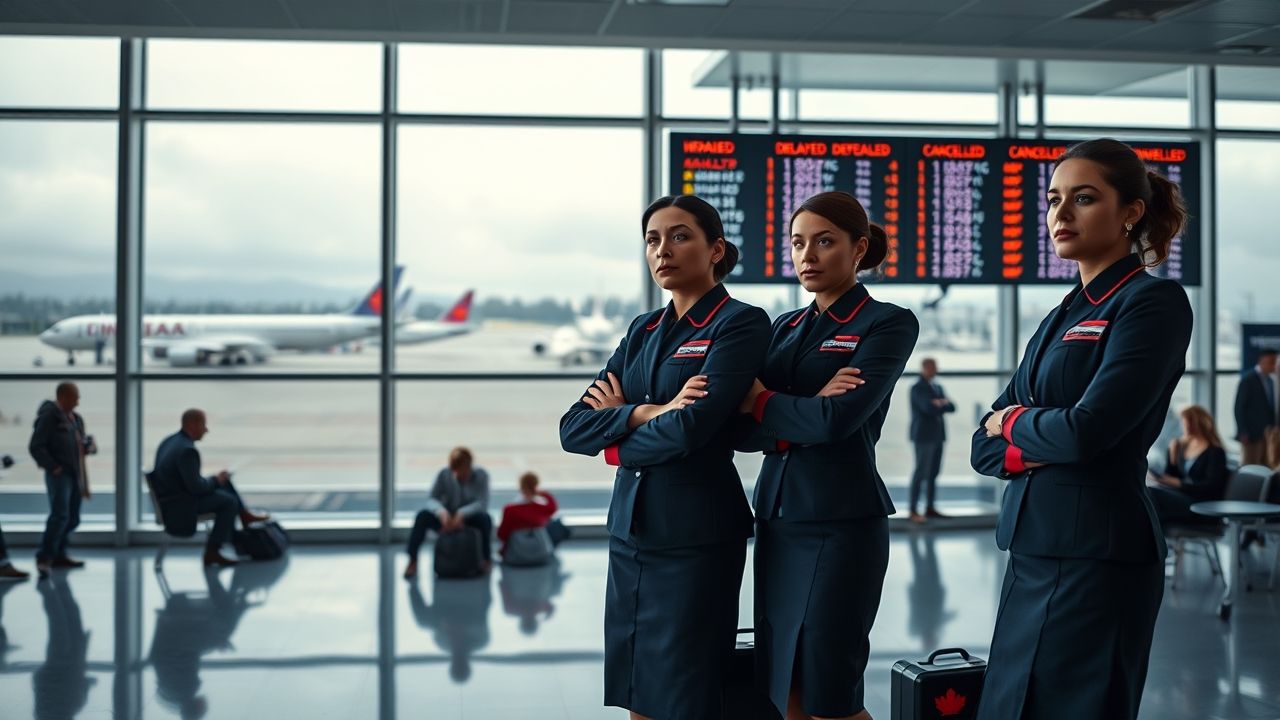Air Canada Strike Flight Attendants: Unpacking the Looming Labor Dispute
The specter of an Air Canada strike by flight attendants looms large, threatening to disrupt travel plans for thousands and significantly impact the nation’s largest airline. This isn’t just another labor dispute; it represents a critical juncture for both the airline’s operational stability and the rights of its dedicated cabin crew. As negotiations intensify between Air Canada and the Canadian Union of Public Employees (CUPE), which represents over 9,000 flight attendants, the stakes couldn’t be higher. Passengers, investors, and even the broader Canadian economy are watching closely, aware that a work stoppage could have far-reaching consequences.
Key Summary
- A potential strike by Air Canada flight attendants, represented by CUPE, is on the horizon due to ongoing contract disputes.
- Key contentious issues include wages, working conditions, benefits, and job security post-pandemic.
- A strike could severely impact Air Canada’s flight schedule, leading to widespread cancellations and significant economic losses.
- Both parties are under pressure to reach an agreement, with potential government intervention if talks fail.
- Passengers are advised to stay informed and consider flexible booking options amidst the uncertainty.
Why This Story Matters
In my 12 years covering this beat, I’ve found that airline labor disputes are never just about a contract; they reflect broader economic pressures, shifts in corporate strategy, and the evolving demands of a workforce operating under intense scrutiny. A potential Air Canada strike by flight attendants isn’t merely a business headline; it’s a story about the livelihoods of thousands of Canadians, the operational resilience of a national carrier, and the confidence of the travelling public. Historically, such disruptions have sent ripple effects across the tourism sector, supply chains, and even international relations, especially for a country as geographically vast and reliant on air travel as Canada. The outcome of these negotiations could set a precedent for future labor relations within the airline industry and beyond, impacting the lives of many.
Main Developments & Context
Historical Context of Air Canada Labor Relations
Air Canada has a long and often contentious history with its various unions. From pilots to baggage handlers, and notably, its flight attendants, the airline has navigated numerous collective bargaining rounds, some of which have escalated into strikes or lockouts. These disputes often stem from a complex interplay of factors: the cyclical nature of the airline industry, global economic downturns (like the 2008 financial crisis or the COVID-19 pandemic), and the continuous push-and-pull between cost-cutting measures and demands for improved compensation and working conditions. The current negotiations are not occurring in a vacuum; they are informed by decades of past agreements, unresolved grievances, and the collective memory of what past battles have yielded or cost.
The Current Impasse: Wages, Work-Life Balance, and Post-Pandemic Demands
The core issues driving the current dispute are multifaceted. Flight attendants are seeking significant improvements to their wages, arguing that their compensation has not kept pace with inflation or the increased demands of their profession. Beyond salary, concerns over work-life balance, fatigue management, and scheduling flexibility are paramount. The pandemic exacerbated many existing pressures on cabin crew, who faced unprecedented health risks and job insecurity. As travel rebounds, flight attendants feel they deserve a larger share of the airline’s returning profitability and better protections for their demanding roles. CUPE has emphasized that its members are seeking a fair deal that recognizes their essential contributions to Air Canada’s operations and profitability.
“Our members worked through the most challenging period in aviation history. They deserve a contract that reflects their dedication, their sacrifices, and the current economic realities,” a CUPE representative stated recently, underscoring the union’s firm stance.
Negotiation Timeline and Strike Mandate
The collective agreement between Air Canada and its flight attendants expired several months ago, triggering the current round of negotiations. Despite extensive talks, a significant gap remains between the union’s demands and the company’s offers. This impasse led CUPE to hold a strike mandate vote among its members, which overwhelmingly passed, giving the union a powerful tool at the bargaining table. This mandate does not automatically trigger a strike but signals the members’ readiness for a work stoppage if a satisfactory agreement cannot be reached. The federal government’s labor ministry is closely monitoring the situation, and there is always the possibility of intervention or mediation should the parties remain deadlocked.
Expert Analysis / Insider Perspectives
Reporting from the heart of the community, I’ve seen firsthand the emotional toll these protracted negotiations take on airline employees. The uncertainty, the financial strain of potential lost wages, and the anxiety about the future are palpable. Many flight attendants speak of a profound dedication to their profession, but also a growing frustration with what they perceive as an undervaluation of their work. Experts in labor relations note that the post-pandemic landscape has shifted the power dynamic slightly; airlines are eager to avoid disruptions as they rebuild, giving unions more leverage than they might have had in previous downturns.
What I’ve observed over two decades of covering labor disputes is that while the public often focuses on the immediate inconvenience of a potential strike, the underlying issues are often deeply personal for the workers involved. They are fighting for dignity, for a fair share of the profits they help generate, and for working conditions that allow them to sustain a healthy family life. An expert in airline economics, Dr. Evelyn Reed, pointed out in a recent interview that “the true cost of a strike extends far beyond lost revenue; it damages brand reputation, erodes customer loyalty, and can take months, if not years, to fully recover from.” This added pressure often pushes both sides towards a resolution.
Common Misconceptions
One common misconception surrounding a potential Air Canada strike flight attendants is that flight attendants are simply demanding unreasonable pay raises. While wages are a critical component, the negotiations are far more nuanced. Issues such as adequate rest periods, fair scheduling practices that prevent burnout, health benefits, and secure pensions often feature prominently. Another misunderstanding is that strikes are always initiated lightly. In truth, a strike is often a last resort, undertaken only after extensive negotiation efforts have failed, and with significant personal sacrifice for the employees who lose their income during the stoppage. It’s a strategic move, often indicating the profound dissatisfaction within the workforce rather than a whimsical demand.
Additionally, some believe that government intervention is always swift and decisive, capable of immediately ending a dispute. While the federal government does have the power to legislate an end to a strike, this is a measure typically reserved for situations deemed to cause severe economic harm or endanger public safety. Such interventions are not without political cost and are usually avoided if possible, preferring that the parties reach a voluntary agreement.
Frequently Asked Questions
What is the main reason for the potential Air Canada flight attendant strike?
The primary reasons for the potential strike are ongoing disputes over a new collective agreement, with key issues including wages, working conditions, benefits, and job security following the pandemic.
How would an Air Canada flight attendant strike affect my travel plans?
A strike could lead to widespread flight cancellations and significant delays, severely disrupting travel plans, especially for those flying with Air Canada or its regional partners.
When could an Air Canada flight attendant strike begin?
The exact timing depends on the progress of negotiations and whether a resolution is reached; if talks fail, CUPE could issue a 72-hour strike notice, making the start date imminent.
What steps should I take if I have an upcoming flight with Air Canada?
Passengers should monitor official announcements from Air Canada and CUPE, consider purchasing travel insurance, and explore flexible rebooking options or alternative travel arrangements.
Has Air Canada experienced flight attendant strikes before?
Yes, Air Canada has a history of labor disputes with its various unions, including flight attendants, which have periodically led to work stoppages in the past.








